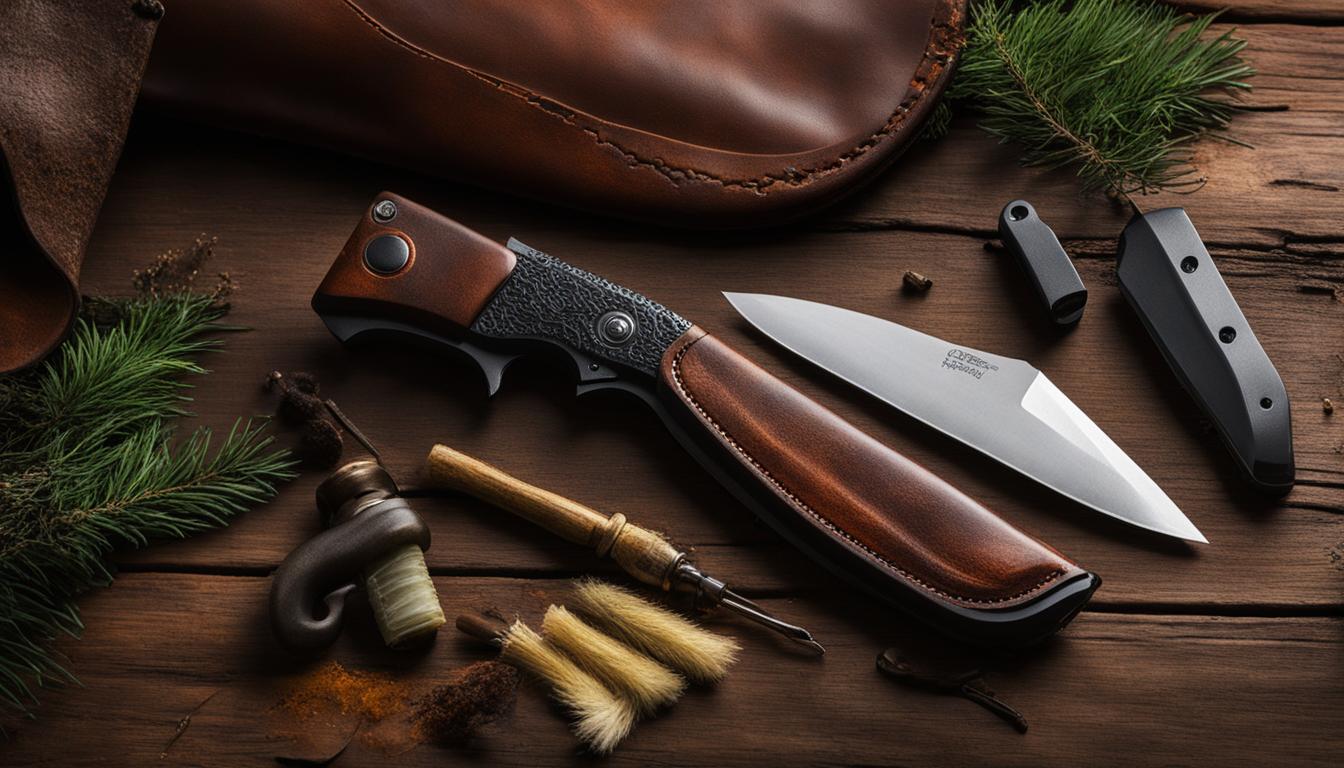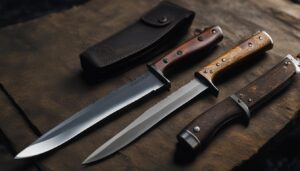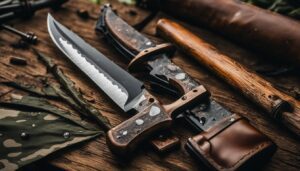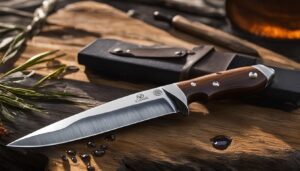Rust prevention for hunting knives is essential for ensuring their longevity and performance. Hunting knives, whether made of carbon steel or stainless steel, are susceptible to rust if not properly cared for. In this comprehensive guide, I will share valuable tips and techniques to help you prevent rust formation on your hunting knife.
As a passionate hunter and knife enthusiast, I understand the importance of preserving the quality of these valuable tools. By taking proactive measures to prevent rust, you can ensure that your hunting knife remains in top condition for years to come.
Key Takeaways:
- Regularly clean and dry your hunting knife after each use to remove any acidic materials or moisture that can cause rust.
- Apply a specialized blade wax, such as MKC blade wax, to protect your knife from moisture and prevent rust formation.
- Choose the right oil for rust prevention, such as beeswax-based blade wax or mineral oil, to provide a protective barrier against rust.
- If you frequently use your hunting knife in saltwater environments, opt for a rust-resistant stainless steel blade like MagnaCut stainless steel.
- Proper storage of your hunting knife is crucial in preventing rust formation. Ensure the sheath is dry and store the knife in a cool, dry place.
Why Does Rust Form in Hunting Knives?
Rust is a common occurrence in hunting knives, but understanding why it forms can help you take better care of your prized blade. Steel rusts when iron reacts with oxygen and water, resulting in a reddish-brown buildup known as corrosion. This process can be detrimental to the blade’s integrity if left unchecked. It’s important to note that rust is different from the desirable patina that forms on carbon steel blades. A patina is a protective layer that develops naturally and enhances the knife’s character, while rust can compromise its functionality.
When it comes to hunting knives, rust is more likely to occur in carbon steel blades compared to stainless steel. Carbon steel has a lower chromium content, making it more susceptible to rust. Stainless steel, on the other hand, is more resistant to corrosion due to its higher chromium content. However, even stainless steel blades can rust when abused or improperly cared for. Knowing the difference between rust and patina is crucial for proper knife maintenance and prevention strategies.
“Rust is different from the desirable patina that forms on carbon steel blades.”
Preventing rust on your hunting knife requires a combination of regular cleaning, drying, and proper storage. By removing moisture and acidic materials from the blade, you can minimize the conditions that facilitate rust formation. Additionally, applying a protective blade wax, such as the MKC blade wax, creates a barrier against moisture and further safeguards your knife. Remember to keep the sheath dry as well to prevent any rusting from occurring inside.
| Types of Steel | Rust Resistance | Care Requirements |
|---|---|---|
| Carbon Steel | Low | Regular cleaning, drying, and wax application |
| Stainless Steel | Higher | Regular cleaning and drying |
Understanding the factors that contribute to rust formation in hunting knives empowers you to take better care of your blade. By maintaining a clean and dry blade, applying a protective wax, and choosing the right steel for your needs, you can enjoy a rust-free hunting knife for years to come.
Summary:
- Rust forms on hunting knives when iron reacts with oxygen and water, leading to corrosion.
- Carbon steel blades have a higher risk of rust due to their lower chromium content compared to stainless steel.
- Differentiate between rust and patina to properly care for your hunting knife.
- To prevent rust, clean the blade thoroughly, apply a protective wax, and keep the sheath dry.
- Understanding the rust resistance and care requirements of different steel types can help in preventing rust formation.
How Hunting Knife Manufacturers Prevent Rust
Hunting knife manufacturers employ various techniques to prevent rust and ensure the longevity of their blades. One such company is the Montana Knife Company (MKC), known for its commitment to quality and innovation in knife manufacturing.
One of the techniques used by MKC is Parkerizing, a process of phosphate coating that protects carbon steel blades from rust. This treatment creates a durable surface that is resistant to corrosion. By applying the Parkerized coating, MKC enhances the rust prevention properties of their knives, especially for those made of carbon steel.
Another method used by manufacturers like MKC is the application of Cerakote—a ceramic-based protective finish. Cerakote provides a robust barrier against moisture, wear, and tear. This coating not only adds an extra layer of protection but also enhances the overall durability and aesthetics of the hunting knife.
By employing these rust prevention techniques, hunting knife manufacturers like Montana Knife Company ensure that their knives can withstand the rigors of outdoor use, allowing hunters to focus on their pursuits without worrying about rust or corrosion.
| Rust Prevention Techniques | MKC Application |
|---|---|
| Parkerizing | Used to protect carbon steel blades from rust |
| Cerakote | Ceramic-based finish for added moisture resistance and durability |
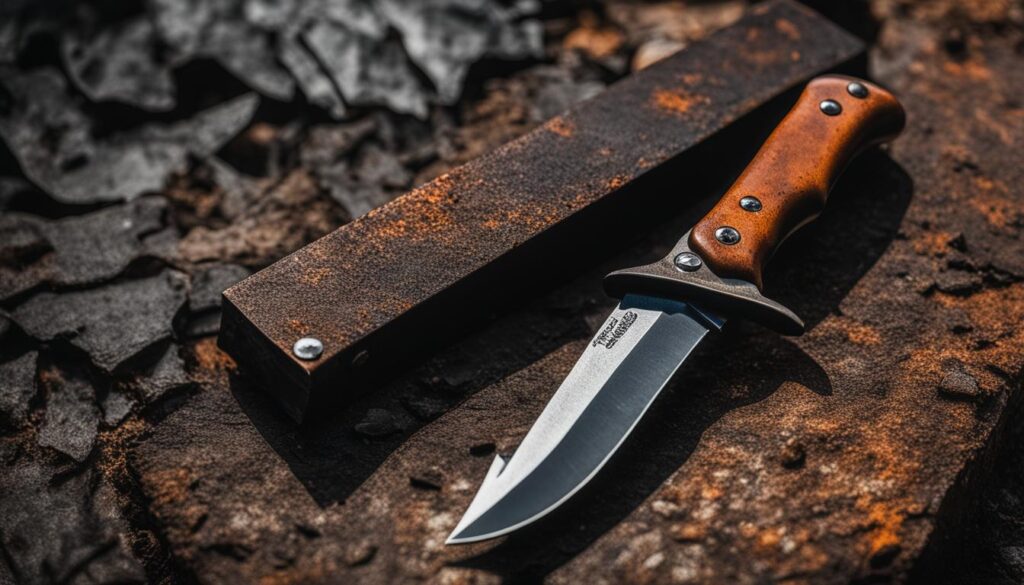
As demonstrated by the table, Montana Knife Company utilizes both Parkerizing and Cerakote to offer effective rust prevention solutions for their hunting knives. These techniques not only protect the blades from rust but also enhance their overall performance and longevity.
Tips for Preventing Rust on Hunting Knives
Proper care and maintenance are crucial to prevent rust formation on your hunting knife. By following these tips, you can ensure that your knife stays in top condition for years to come:
Clean the blade thoroughly
After each use, make it a habit to clean the blade thoroughly. Use soapy water and a soft cloth or sponge to remove any dirt, debris, or acidic materials that can cause corrosion. Be sure to dry the blade completely to eliminate any moisture that can lead to rust formation.
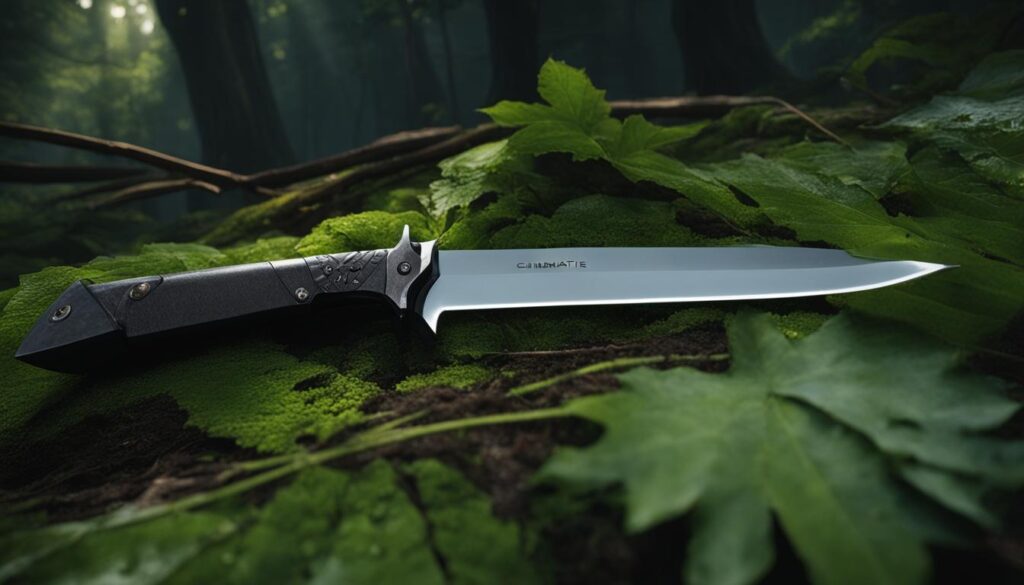

Wax on, wax off
Applying a blade wax after cleaning is an effective way to protect your hunting knife from rust. The wax creates a barrier that seals out moisture and prevents oxidation. Look for a high-quality blade wax, such as MKC blade wax, and apply it according to the manufacturer’s instructions. Regularly reapply the wax to maintain maximum protection.
Keep the sheath dry
In addition to caring for the blade, it’s important to keep the sheath dry. Moisture can accumulate inside the sheath and promote rust formation. After cleaning and drying the blade, ensure that the sheath is also completely dry before storing the knife. If the sheath gets wet, allow it to air dry before inserting the knife.
Following these tips will help you prevent rust on your hunting knife and keep it in excellent condition. Remember to clean the blade thoroughly, apply a protective wax, and keep the sheath dry. By giving your knife the proper care it deserves, you can enjoy its reliable performance on your hunting adventures.
Choosing the Right Oil for Rust Prevention
When it comes to preventing rust on your hunting knife, choosing the right oil is essential. Different oils offer varying levels of protection and can help keep your blade in top condition. Here are some options to consider:
- Beeswax-based blade wax: Beeswax is a popular choice for rust prevention due to its natural properties. It forms a protective barrier on the blade, keeping moisture out and preventing rust formation. The MKC blade wax, made from beeswax, is an excellent option as it is food safe and odor-free.
- Mineral oil: Mineral oil is another effective choice for preventing rust on hunting knives. It acts as a barrier between the blade and moisture, inhibiting rust formation. It is important to use food-grade mineral oil to ensure it is safe to use on your knife.
- Tsubaki oil: Tsubaki oil, also known as camellia oil, is a traditional Japanese oil used for rust prevention in steel blades. It has excellent anti-corrosion properties and can help protect your hunting knife from rust. Tsubaki oil is safe to use on food preparation tools as well.
When applying any oil to your hunting knife, make sure to follow the manufacturer’s instructions. Apply a thin and even layer of oil to the blade, ensuring complete coverage. It is also essential to regularly clean and oil your knife to maintain its rust-resistant properties.
Remember, choosing the right oil for rust prevention is just one part of proper knife maintenance. Regular cleaning, drying, and storing your hunting knife in a dry environment are equally important to prevent rust formation. By taking these steps, you can ensure that your hunting knife remains in optimal condition for years to come.
Table: Comparison of Rust Prevention Oils
| Oil Type | Advantages |
|---|---|
| Beeswax-based blade wax | Form a protective barrier, food safe, odor-free |
| Mineral oil | Acts as a barrier, inhibits rust formation, food-grade |
| Tsubaki oil | Excellent anti-corrosion properties, safe for food preparation tools |
“Using the right oil can effectively prevent rust formation on your hunting knife. Whether you choose beeswax-based blade wax, mineral oil, or Tsubaki oil, the key is to create a protective barrier between the blade and moisture. Regular cleaning, drying, and oiling are crucial for maintaining your knife’s rust-resistant properties.”
Avoiding Rust in Saltwater Environments
When using a hunting knife in saltwater environments, the risk of rust formation increases significantly. Saltwater is known to be harsh on steel, making it crucial to take extra precautions to prevent rust on your blade. Fortunately, there are steps you can take to protect your hunting knife and ensure its longevity, even in coastal areas.
MagnaCut stainless steel is an excellent option for those who frequently use their hunting knife in saltwater environments. This type of stainless steel is specifically designed to resist rust and corrosion, making it highly suitable for coastal hunting trips. However, it’s important to note that even stainless steel blades still require proper care and maintenance to avoid rust formation.
In addition to choosing a rust-resistant stainless steel, it’s recommended to apply a protective blade wax to your hunting knife. This creates an additional barrier against moisture and helps prevent rust from forming. Properly cleaning and drying the blade after each use is also essential in saltwater environments, as it removes any salt residue that can contribute to rust formation.
By following these tips and taking proactive measures to avoid rust in saltwater environments, you can ensure that your hunting knife remains in optimal condition for years to come. Remember to choose a rust-resistant stainless steel like MagnaCut, apply a protective blade wax regularly, and clean and dry your knife thoroughly after each use. With proper care and maintenance, your hunting knife will continue to perform reliably, even in coastal areas.
Conclusion
Rust prevention is crucial for maintaining the longevity and performance of your hunting knife. With the right care and attention, you can effectively prevent rust formation on your blade. Whether your knife is made of carbon steel, stainless steel, or Damascus steel, proper maintenance is key. Here are some important tips to keep in mind:
1. Clean and Dry the Blade:
After each use, make sure to clean your hunting knife thoroughly. Use soapy water to remove any acidic materials or moisture that can lead to rust. Dry the blade completely before storing it to prevent any lingering moisture.
2. Apply a Blade Wax:
Applying a blade wax, such as the MKC blade wax, after cleaning can provide an additional layer of protection against rust. This wax helps to seal the blade and shield it from moisture. It is a simple and effective way to prolong the life of your hunting knife.
3. Store Properly:
Proper storage is essential for rust prevention. Ensure that your hunting knife is stored in a dry and well-ventilated area. Avoid storing it in a sheath that retains moisture, as this can promote rust formation. A well-maintained knife has a better chance of remaining rust-free for years to come.
By following these rust prevention tips and taking proper care of your hunting knife, you can enjoy its reliable performance and durability. Whether you have a Damascus steel blade, carbon steel, or stainless steel, make sure to prioritize maintenance to keep your knife in top condition.
FAQ
How can I prevent rust on my hunting knife?
To prevent rust on your hunting knife, clean the blade thoroughly after each use, dry it completely, and apply a blade wax for added protection. It is also important to keep the sheath dry to avoid rusting inside.
What is the difference between rust and patina on a knife?
Rust is a reddish-brown buildup that forms on steel when iron reacts with oxygen and water. It can destroy the blade if left unchecked. Patina, on the other hand, is a yellowish protective color that develops on the surface of a carbon steel blade.
What techniques do hunting knife manufacturers use to prevent rust?
Hunting knife manufacturers like the Montana Knife Company use techniques such as Parkerizing and Cerakote to prevent rust. Parkerizing is a phosphate coating process that protects carbon steel, while Cerakote is a durable ceramic finish resistant to wear and tear.
What is the best oil to use for rust prevention on a hunting knife?
Beeswax-based blade wax, like MKC blade wax, is a popular choice as it is made with natural materials, food safe, and does not have a strong odor. Other options include mineral oil and Tsubaki oil, which are specifically designed for rust prevention in steel.
Can saltwater cause rust on a hunting knife?
Yes, saltwater is particularly harsh on steel and can quickly lead to rust formation. If you frequently use your hunting knife in saltwater environments, it is recommended to choose a rust-resistant stainless steel like MagnaCut stainless steel.
How important is proper care for preventing rust on hunting knives?
Proper care and maintenance are essential for preventing rust on hunting knives, regardless of the type of steel. By following rust prevention tips such as cleaning and drying the blade, applying a protective wax, and storing the knife properly, you can ensure it stays rust-free for years to come.
